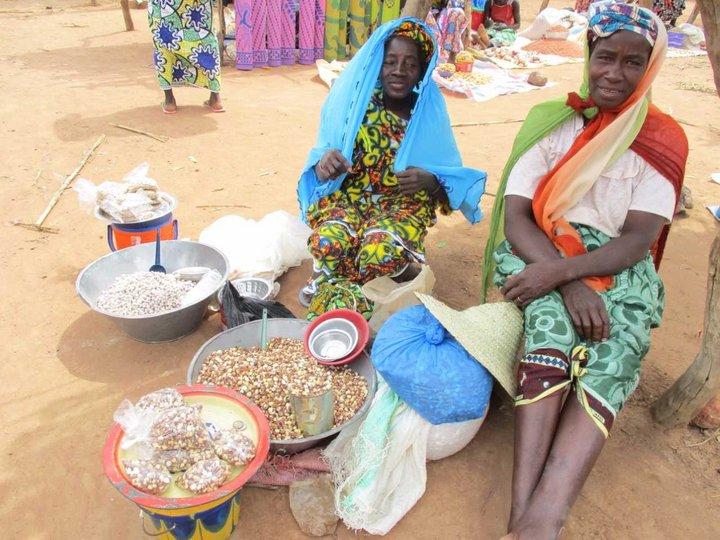Roasted Bambara groundnut: an emerging income source for women in Mali

On the occasion of the International Day of Rural Women, that takes place on 15 October, our researchers give us insight into how Bambara groundnut is emerging as an income source for women in Mali.
Rural women are integrally connected to all aspects of local biodiversity – as users, custodians and agents of change. On the occasion of the International Day of Rural Women, Bioversity International researchers Charlie Mbosso and Gennifer Meldrum give us insight into how Bambara groundnut is emerging as an income source for women in Mali.
Bambara groundnut (Vigna subterranea L. Verdc), a native and underutilized crop, is the third most important legume in Mali. Compared to peanut and cowpea, Bambara groundnut is more resistant to drought and pests and diseases, is better adapted to poor soils and can help secure production under climate change. The crop is nutritious and has proven to be an inexpensive source of good quality protein to poorly-resourced farmers in semi-arid areas, such as Mali. Bambara groundnut is often cultivated by women subsistence farmers who sell the roasted or boiled seeds in local markets.
Earlier this spring, value chain analyses of Bambara groundnut in Sikasso and Segou regions of Mali were carried out with a special emphasis on gender and nutrition. Data was collected in eight villages through focus group discussions and individual surveys led by Bioversity International’s consulting market and gender specialist Charlie Mbosso in collaboration with Institut d’Economie Rurale (IER). Results indicated that roasted Bambara groundnut has potential as an emerging market for women, yet women need encouragement and support for the promotion of the crop.
The household survey results revealed that, at household level, there are more men involved in Bambara groundnut production while women are more involved in the legume's processing and commercialization. This gendered engagement is related to socio-cultural factors, as specific tasks are traditionally performed by men or women and men have more control over farmlands and household income. Men make decisions on what to grow on family plots and have more access to private plots where they can control what to grow and sell. Fewer women have access to private plots so they are mainly engaged in supporting Bambara groundnut cultivation on family plots.
Women were more fully integrated in the processing and sale of roasted Bambara groundnut which aligns with their traditional role as processors and requires relatively little skill and capital. The sale of roasted Bambara groundnut is confined to nearby markets and small-scale traders and the product is sold at very low prices in small quantities, which make the returns less attractive to men. Due to the ‘snack’ nature of the product (families tend to enjoy it as a mid-morning or mid-afternoon snack), the product is sold at very low prices and in small quantities, which make the returns less attractive to men who rely on returns from Bambara groundnut grains. In addition, results revealed that the roasted product originates from women’s own production and not from grains that are sold in the markets. This way they have easy access to input required for processing such as a pot, water, firewood, salt and something to dry the finished product on.
Poor quality of transformed products due to women's lack of knowledge of appropriate processing and storage techniques and lack of processing equipment were found to be the main constraints to women. In addition, marketers' poor sales skills sometimes led to the failure to sell the transformed products.
Linking producers to local processors could help to extend the marketing area. However, in order to achieve this, both the producers and processors would require training on Bambara groundnut processing techniques since the overall local consumer demand for this product is high. Bambara groundnut commercialization among local women could be encouraged through the creation and consolidation of groups in order to foster a strong network and then increase quantities and reinforce marketing skills through group sales.
Learn more about Bambara groundnut and share this blog post on Sunday, 15 October, on the International Day of Rural Women by using #RuralWomensDay
This research was carried out in the context of the project 'Linking agrobiodiversity value chains, climate adaptation and nutrition: Empowering the poor to manage risk' supported by the International Fund for Agricultural Development (IFAD), the European Commission, and the CGIAR Research Programmes on Climate Change, Agriculture and Food Security (CCAFS) and Agriculture for Nutrition and Health (A4NH).
Photo: Women selling roasted Bambara groundnut at a small market in Mali. Credit: Bioversity International/C.Mbosso
